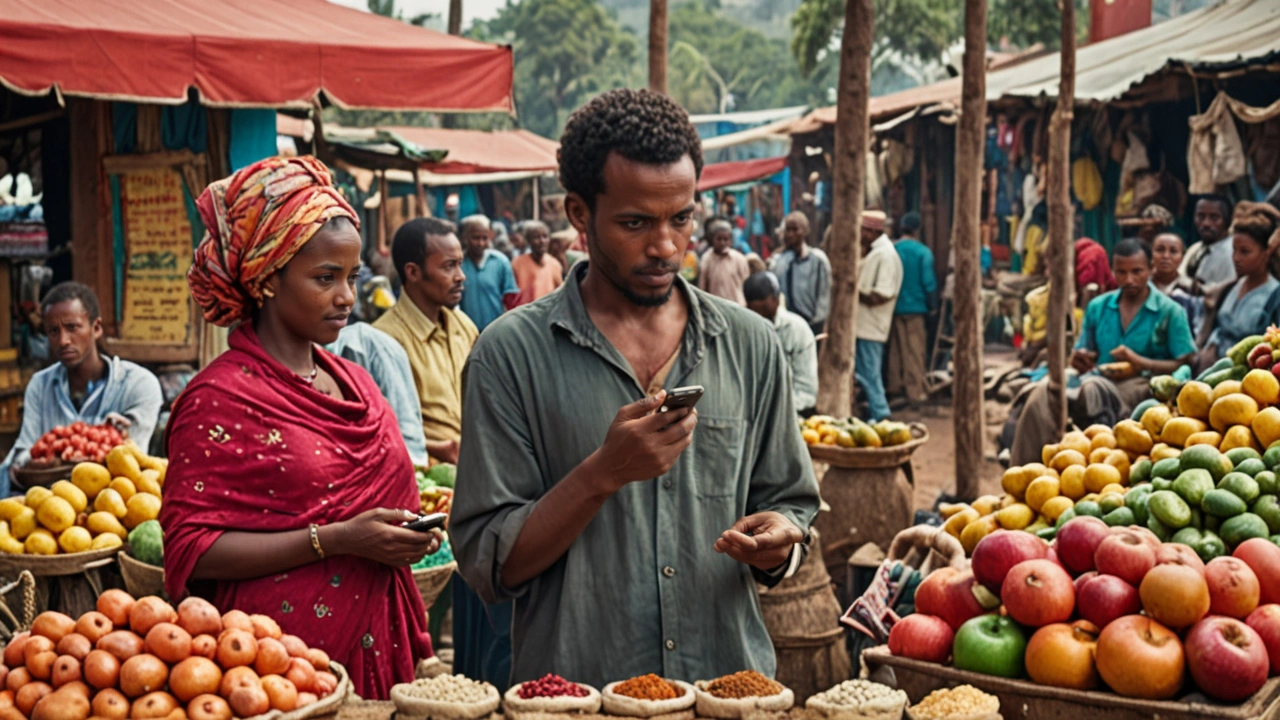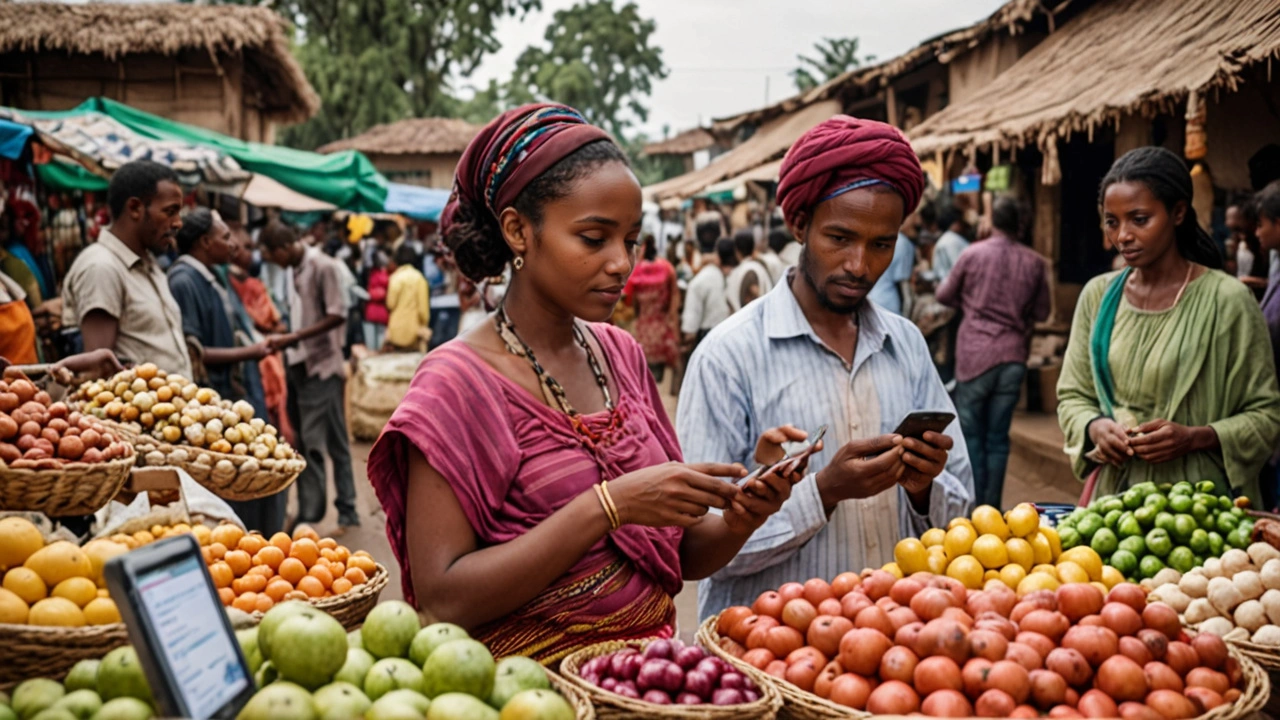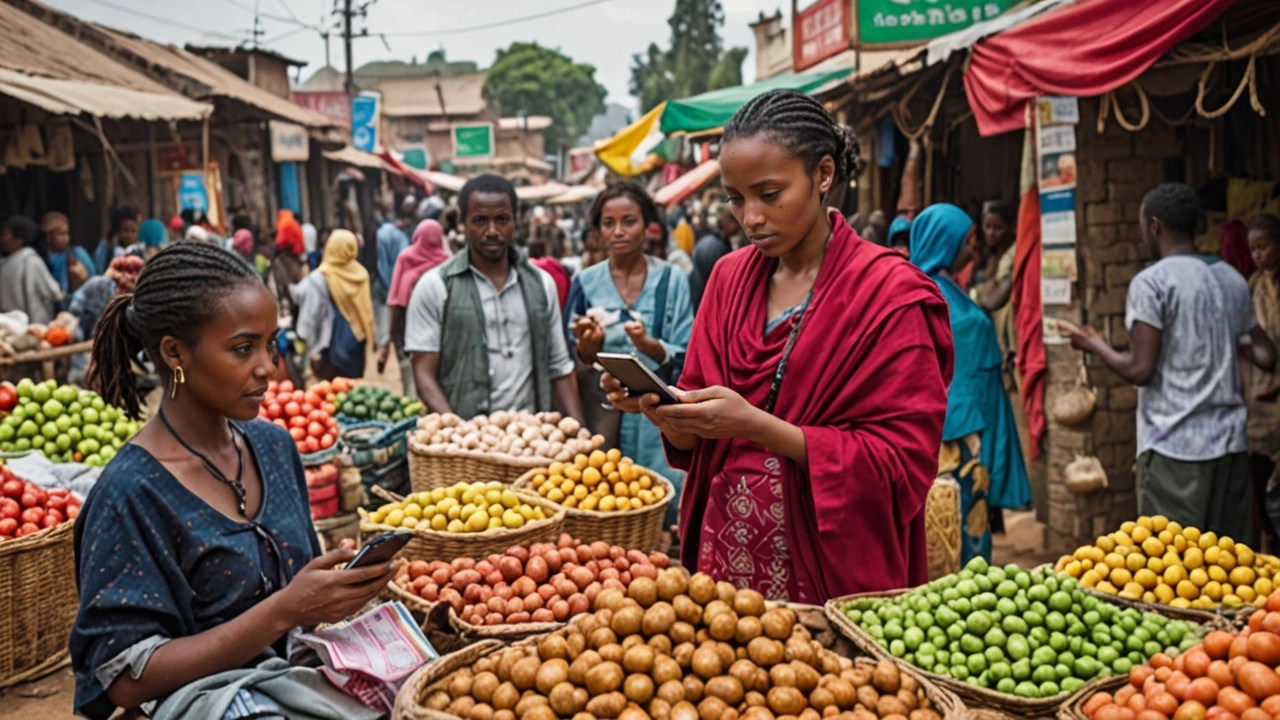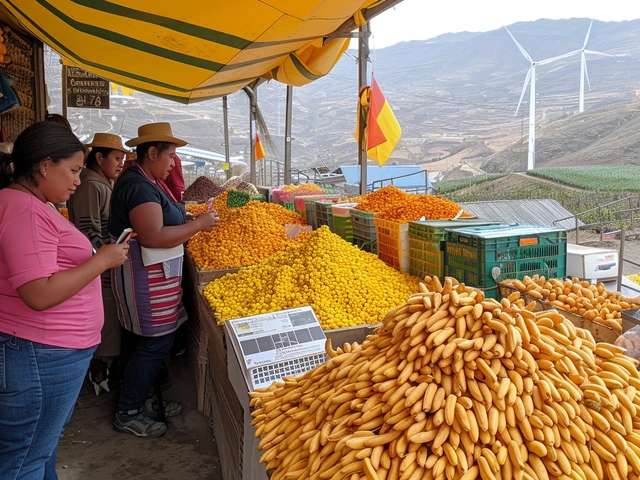Mobile money has been a game-changer in many parts of Africa, providing financial services to the unbanked and bridging gaps in financial inclusion. But how well does it work in specific regions like Ethiopia?
For starters, Ethiopia has seen a rapid growth in mobile phone penetration over the past few years. This wider access to mobile technology has paved the way for services like mobile money to take root, offering a convenient alternative to traditional banking services which are often hard to come by in rural areas.
- Introduction to Mobile Money in Ethiopia
- The Economic Impact
- Challenges and Limitations
- Future Prospects
Introduction to Mobile Money in Ethiopia
Mobile money has become an integral part of the financial landscape in Ethiopia, representing a critical shift in how people manage their financial transactions. This shift is particularly significant in a country where traditional banking infrastructure is not fully developed, especially in rural areas. The journey of mobile money in Ethiopia began in earnest with the launch of services like M-Birr in 2015 and the subsequent entry of telecommunication giants like Ethio Telecom, which launched their own mobile money service called Telebirr in May 2021.
Telebirr has been a game-changer, achieving remarkable milestones in a short period. By September 2021, just four months after its launch, Telebirr registered over 7 million subscribers. This rapid adoption underscores a strong demand for accessible and convenient financial services. A key advantage of mobile money is that it can reach areas where traditional banks cannot, offering services via mobile phones which are more widespread.
Mobile money allows users to make a variety of transactions, including paying utility bills, transferring money, and even receiving salaries. For a country where less than 35% of the population has access to banking services, this technology offers a much-needed solution. A report by the National Bank of Ethiopia indicated that mobile money services have the potential to contribute significantly to the country's GDP by increasing financial inclusion and enabling smoother cash flows.
The Ethiopian government has also shown strong support for the expansion of mobile money. Policies and regulations have evolved to make it easier for service providers to operate. This is part of a broader strategy to build a cashless society and modernize the financial sector. The government’s plan, as outlined in the Digital Ethiopia 2025 strategy, aims to create a more inclusive and digital economy.
One interesting aspect of mobile money’s success in Ethiopia is the way it has been embraced by various segments of the population. Traders, farmers, and small business owners, who previously relied heavily on cash transactions, now use mobile money to conduct business more efficiently. This move has reduced the risks associated with carrying and handling large amounts of cash. According to a survey by the Bill & Melinda Gates Foundation, approximately 27% of Ethiopian adults were using some form of digital financial service by 2023.
The rapid growth of mobile money in Ethiopia is not just a trend; it’s a fundamental shift in how financial services are accessed by millions. - National Bank of Ethiopia
Despite these advancements, the uptake of mobile money is not without challenges. Infrastructure limitations, such as poor internet connectivity in some regions, pose significant hurdles. Moreover, there is a need for continuous public education to build trust and understanding of how to use mobile money securely. Mobile money services have also faced competition from informal financial systems that many Ethiopians still rely on.
Yet, the potential for mobile money in Ethiopia is enormous. As technological infrastructure improves and more people become accustomed to digital transactions, mobile money services are expected to become even more integral to daily life. This transformation is not just about convenience; it’s about unlocking economic opportunities for millions of Ethiopians.

The Economic Impact
The introduction of mobile money in Ethiopia has had a significant impact on the country's economic activities. Ethiopia, with its large rural population, has struggled with financial inclusion for years. Traditional banking services are often out of reach for many due to limited branches and infrastructure. Mobile money services like M-Birr and HelloCash are stepping in to fill this gap, enabling people to conduct financial transactions with ease.
One major impact of mobile money on the Ethiopian economy is the boost in trade and commerce, particularly in rural areas. Farmers are now able to receive payments for their produce directly through their mobile phones, reducing the need for physical cash. This has streamlined transactions and reduced risks associated with handling cash. Additionally, it has fostered savings habits among rural communities who previously had little access to banking services.
Mobile money is also fostering entrepreneurship and small business growth. Small business owners can more easily accept payments, track transactions and manage their finances through mobile money platforms. This is especially important in a country where traditional banking services are not always accessible. For many entrepreneurs, the ability to access and manage funds conveniently through their phones has been transformative, allowing them to focus on growing their businesses.
Interestingly, mobile money is not just benefiting individuals and small businesses but also contributing to the formalization of the economy. With more transactions being conducted digitally, there is greater transparency, which helps in reducing informal economic activities. This has positive implications for tax collection and governance, as a larger portion of the economy can now be monitored and regulated by authorities.
According to a study by the Ethiopian Economics Association, the adoption of mobile money services could potentially increase GDP by up to 2 percent in the long term. This increase is attributed to enhanced efficiency in transactions, improved financial inclusion, and the promotion of savings and investment practices.
The impact of mobile money on employment is another significant aspect. By enabling faster and more reliable financial transactions, mobile money has created new job opportunities, particularly for agents who facilitate these services. With more than 77 million mobile subscribers in Ethiopia, the demand for mobile money agents is substantial, leading to job creation across the country.
Finally, mobile money is having a positive impact on social welfare programs. The Ethiopian government and NGOs are increasingly using mobile money platforms to distribute aid and social benefits directly to beneficiaries. This method ensures that funds reach the intended recipients quickly and reduces administrative overhead, making social welfare programs more effective and efficient.

Challenges and Limitations
One of the biggest challenges facing mobile money adoption in Ethiopia is the lack of infrastructure. Although mobile phone penetration is increasing, many rural areas still experience poor network coverage interrupted by frequent service outages. These problems hinder consistent accessibility to mobile money services, causing frustrations among users who rely heavily on this platform for their transactions.
Another pressing issue is the lack of digital literacy. Many Ethiopians, especially in remote regions, are not familiar with the use of mobile phones beyond basic calling and texting. This limited understanding constrains the potential usage of mobile money services. Educating the populace on how to use these services might take time and effort but is essential for widespread adoption.
Moreover, there are regulatory challenges. The country’s regulatory framework is still evolving when it comes to digital finance. The Ethiopian government has implemented rules to ensure the security and integrity of mobile money transactions, but these regulations can sometimes be restrictive, inhibiting innovation and the agility needed for growth in this sector.
Fraud and security are additional concerns. Mobile money platforms are not immune to cyber-attacks and scams. This can erode trust among potential users. A person in a village losing their entire savings due to a scam can have far-reaching consequences. Thus, improving the security of transactions and educating users on safe practices are fundamental steps toward earning consumer trust.
Interoperability between different mobile money platforms is another hiccup. Multiple service providers operate within Ethiopia, but their systems are often not compatible with each other. This limitation forces users to stick to one service provider or face complications in transferring funds between different platforms. In a market that could benefit from seamless integration, this fragmentation is a significant setback.
Economic factors also play a role in hindering the growth of mobile money in Ethiopia. With a significant portion of the population living below the poverty line, not everyone can afford a mobile phone or the associated costs of using mobile money services. Even for those who do have mobile phones, the cost of maintaining a data plan can be prohibitive.
“The success of mobile money in Ethiopia depends on addressing the unique challenges the country faces, from regulatory hurdles to infrastructure deficits,” says Sophia Bekele, a noted figure in African digital finance.
Lastly, traditional banking institutions often view mobile money operators as competitors rather than partners. This lack of collaboration can create unnecessary barriers, reducing the efficiency and reach of financial services. Finding ways to foster cooperative relationships between banks and mobile money providers could unlock new potentials in the financial landscape.

Future Prospects
The future of mobile money in Ethiopia looks promising, driven by ongoing technological advancements and government initiatives. As mobile phone usage continues to rise, the potential for mobile money services to reach even the most remote corners of the country becomes more attainable. Policymakers and financial stakeholders are keen to leverage this trend to boost financial inclusion and promote economic growth.
One significant development is the Ethiopian government's proactive stance on digital financial services. Recognizing the importance of mobile money in enhancing financial access, the government has introduced favorable policies and regulatory frameworks. For instance, the National Bank of Ethiopia has issued licenses to several mobile money operators, enabling them to operate legally and securely within the country.
Another crucial factor is the growing interest from international investors and partners. Companies specializing in mobile banking and fintech are eyeing Ethiopia as an untapped market with immense potential. These collaborations are expected to bring in much-needed technology and expertise, propelling the industry forward. According to a report by the World Bank, Ethiopia's financial sector could see investments worth billions in the coming decade, largely driven by digital financial services.
“The digitalization of financial services is not just a trend; it’s a necessity for economic development. Ethiopia is on the right path, and with the right investments, the impact could be transformative.” - World Bank Report
Educational campaigns and training programs are also on the rise to help people understand and trust mobile money systems. In many rural areas, lack of knowledge about digital finance acts as a barrier. To tackle this, mobile money providers are conducting workshops and informational sessions to familiarize locals with the benefits and safety of using mobile money for daily transactions.
If these initiatives gain momentum, we could see a substantial shift in Ethiopia’s financial landscape. More people will move away from cash-based transactions, opting instead for the safer and more convenient option of mobile money. This shift could lead to better tracking of economic activities, higher tax revenues, and overall improved economic stability.
Youth involvement is another promising area for the future of mobile money in Ethiopia. With a large portion of the population being young and tech-savvy, there is a natural inclination towards adopting digital financial services. Schools and universities are integrating financial literacy into their curriculums, ensuring that the next generation is well-equipped to leverage mobile money services effectively.
Of course, there are still challenges to address, such as network infrastructure limitations and cybersecurity concerns. However, with the combined efforts of the government, private sector, and international partners, Ethiopia is poised to overcome these hurdles. The key lies in continuous innovation and a commitment to creating an inclusive financial ecosystem.

 Understanding Wage Rates in Ethiopia: What You Need to Know
Understanding Wage Rates in Ethiopia: What You Need to Know
 Is It Affordable to Live in Addis Ababa? Exploring Costs and Salaries
Is It Affordable to Live in Addis Ababa? Exploring Costs and Salaries
 Earning a Living in Ethiopia: Diverse Opportunities in an Evolving Economy
Earning a Living in Ethiopia: Diverse Opportunities in an Evolving Economy
 Exploring Career Opportunities in Ethiopian Industries
Exploring Career Opportunities in Ethiopian Industries
 Unlocking Opportunities: Effective Ways to Make Money Online in Ethiopia
Unlocking Opportunities: Effective Ways to Make Money Online in Ethiopia
Reagan Traphagen
July 15, 2024 AT 17:46What they don’t tell you is that the mobile‑money boom in Ethiopia is being used as a massive data‑harvesting operation. Every transaction you make is logged, analyzed, and fed to the state’s surveillance apparatus. They say it’s about financial inclusion, but the real agenda is control. The rapid rollout of Telebirr was suspiciously timed with new cyber‑law reforms that give the government unchecked access to user data. If you’re not careful, you’re basically handing your wallet over to a digital watchdog.
mark sweeney
July 15, 2024 AT 21:00Ah, but consider the metaphysical implications of digitized cash flow – it is not merely a tool of oppression but a mirror of societal evolution. One could argue that Telebirr’s meteoric rise reflects a collective yearning for autonomy, even if the veneer of control is what the powers-that-be project. The irony lies in the fact that we critique the system while simultaneously embracing its convenience. Still, the underlying currents remain opaque, and the truth is often couched in bureaucratic jargon. So, maybe it’s not all black and white, maybe we’re just dancing on a digital tightrope.
randy mcgrath
July 16, 2024 AT 00:20I get where you’re coming from, and it’s worth remembering that technology itself is neutral; it’s the policies around it that shape outcomes. In many Ethiopian villages, the ability to send money to a relative in a city without a trip to a bank has tangible benefits. When you look at the data, transaction volume correlates with increased household savings. So while vigilance is healthy, outright dismissal overlooks the real uplift some people experience.
Frankie Mobley
July 16, 2024 AT 03:56Mobile money in Ethiopia works much like it does elsewhere – you register your phone number, link it to an ID, and then you can send, receive, or pay bills using a simple app. The biggest advantage is that agents are stationed in local markets, so you don’t need a bank branch to cash out. This has helped farmers get paid faster after harvest, which reduces the risk of cash loss. The service also supports government payouts, making social assistance more transparent.
ashli john
July 16, 2024 AT 04:46Great stuff keep it up!
Kim Chase
July 16, 2024 AT 06:43It’s exciting to see how the Ethiopian government is backing digital finance, but the real key will be making sure the infrastructure reaches the most remote areas. Partnerships between telecoms and local NGOs could bridge the gap where network coverage is weak. If we keep the conversation inclusive and focus on education, the adoption curve will keep climbing.
David Werner
July 16, 2024 AT 10:20Don’t be fooled – the push for mobile money is a cover for a larger plan to integrate Ethiopia into a global financial monitoring grid. Once everyone is on the same app, there’s no way to hide transactions from the elite.
Paul KEIL
July 16, 2024 AT 11:43While the rhetoric glorifies inclusion the operational metrics reveal a fragmented ecosystem – interoperability deficits, agent saturation, and asymmetric fee structures undermine scalability. In practice, the platform’s architecture imposes a de‑facto monopoly that stifles competitive innovation and perpetuates vendor lock‑in.
Horace Wormely
July 16, 2024 AT 13:40Just a note – the sentence "Mobile money has become an integral part of the financial landscape" should use “has” as the verb for singular "Mobile money"; also, avoid the double space before "especially" in the paragraph about challenges.
christine mae cotejo
July 16, 2024 AT 17:50Reading through the entire overview, one cannot help but feel a profound sense of awe at the transformative potential that these digital platforms hold for a nation like Ethiopia. The narrative weaves together threads of technological optimism, governmental ambition, and grassroots resilience, painting a picture that is both hopeful and complex. It is especially striking how mobile money has carved out a space for financial agency among farmers who once relied solely on cash transactions, thereby reducing the vulnerability of their earnings to theft or loss. Moreover, the data indicating a 27% adoption rate among adults by 2023 is a testament to the rapid diffusion of digital habits in a society traditionally anchored in informal economies. Yet, the challenges highlighted-poor network coverage, low digital literacy, and regulatory flux-serve as stark reminders that the road ahead is fraught with obstacles. The mention of interoperability issues, for instance, underscores a systemic fragility that could impede the seamless flow of funds across different service providers, a problem that could be ameliorated through collaborative standards. In addition, the emphasis on government programs such as Digital Ethiopia 2025 illustrates a policy framework that is aligning itself with global fintech trends, but execution will require sustained investment in infrastructure and education. The discussion around social welfare distribution via mobile money is particularly compelling, as it showcases a tangible benefit where speed and accuracy can mean the difference between aid arriving on time or not. The potential for job creation through agent networks also adds a socioeconomic dimension that goes beyond mere financial inclusion. While the article poignantly notes the need for continuous public education, it could have delved deeper into the role of community-based training initiatives that have proven effective in similar contexts. Likewise, the future prospects section might have explored the possibilities of integrating mobile money with emerging technologies such as blockchain to further enhance transparency and trust. Overall, the piece masterfully balances optimism with realism, inviting readers to contemplate not only the current state of mobile money in Ethiopia but also its broader implications for economic development, governance, and societal change.
Douglas Gnesda
July 16, 2024 AT 19:46Excellent synthesis! Building on your points, the scalability of mobile money hinges on robust API frameworks that enable third‑party developers to create value‑added services. For instance, leveraging open‑banking standards could allow micro‑insurance products to be bundled directly within the app, increasing user engagement and financial resilience. Additionally, adopting lightweight encryption protocols will address the security concerns you mentioned without overburdening low‑end devices. Finally, a tiered agent incentive model-combining fixed fees with performance‑based bonuses-could mitigate the saturation issue while encouraging better customer service.